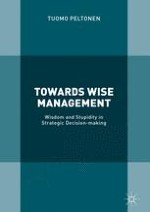2019 | OriginalPaper | Buchkapitel
7. In Conclusion: The Opportunities and Obstacles of Reinforcing Wisdom in Management
verfasst von : Tuomo Peltonen
Erschienen in: Towards Wise Management
Verlag: Springer International Publishing
Aktivieren Sie unsere intelligente Suche, um passende Fachinhalte oder Patente zu finden.
Wählen Sie Textabschnitte aus um mit Künstlicher Intelligenz passenden Patente zu finden. powered by
Markieren Sie Textabschnitte, um KI-gestützt weitere passende Inhalte zu finden. powered by
